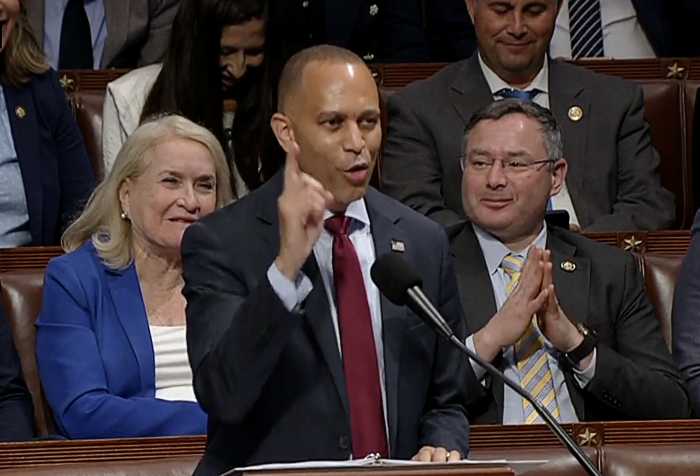Parents came out in droves last week at the Sept. 17 board of education action meeting to voice myriad of complaints with the transportation procedures in the district—chief of them with the lack of busing for younger students and what they called disorganized pick-up. The board and administration say they are working to find solutions to the transportation issues, rolling out a pilot program this week at Park Avenue that will attempt to speed up pick-up.
The little theater was standing room only as parents packed out the room to pick up the conversation from the Sept. 10 board of education meeting, where they first brought their frustrations to the board and administration. During a 90-minute public hearing, parents and community members expressed a number of complaints with transportation including issues with bus routes, bus passes, idling buses and lack of bus monitors. Many of the complaints centered around busing changes that had resulted with the elementary school configuration, as parents implored the district to provide busing for all students and submitted a 150-signature petition asking them to change the transportation policy.
“The unilateral reconfiguration of the elementary schools was unfair,” said H. Hendricks, a parent who organized the petition. “The reconfiguration is what caused this problem. You need to reconsider. These kids cannot walk through New Cassel like this, some streets don’t even have sidewalks. We need buses for our kids.”
With Park Avenue, Drexel Avenue and Powells Lane now housing grades 1 to 5 and students being separated by which school is closest to them, rather than grade level, many students found themselves no longer eligible to take the bus as per the transportation policy previously set in place by the district. The policy currently allows busing for children in Pre-K to second grade who live two-tenths of a mile or more away; from grades 3 to 6 who live more than three-quarters of a mile away, and for those in seventh-grade and up who live more than one mile away. Parents found themselves scrambling to find alternate arrangements for their children to get to school, some of them having to take off work or change their schedules to drop off and pick-up their kids, saying they weren’t comfortable with them walking alone.
“My daughter has to walk 11 blocks,” said Jeannie Cong who has no car to drop her daughter off to Park Avenue. “The climate isn’t bad now but what happens when it starts raining and gets cold? And Prospect Avenue is dangerous.”
The lack of busing is only half the problem for parents. They’re also exasperated at the pick-up process at the elementary schools, which they say is time-consuming and disorganized. At Park Avenue, which has approximately 450 walkers, parents say they’ve waited 45 minutes to an hour to pick up their child. Pick up currently involves showing staff identification and signing the child out, however the administration will be rolling out a test program at Park Avenue this week that they hope will cut down some of the waiting time.
District technology head Jay Marcucchi presented the ScholarChip program to the board. The program is already in place in the high school, and is a chip that’s implanted into teacher and student ID cards, granting them access to areas such as the cafeteria, as well as helping with attendance. For Park Avenue pick-up, a chip will be embedded in a small keychain fob that parents will have to touch at a reader at a station-that will be manned by a staff member. If a visitor is picking up the student, they would have to go through the traditional line.
To get the fob, parents would just have to register at the school, which Marcucchi said would be a very quick process. One fob will be issued per parent. Many parents might already be registered, since the program is part of the Visitor Management System the district already has in place. ScholarChip will be lending the district two systems to test out its effectiveness, which they plan to put at Park Avenue right away. If it’s effective, they will roll it out to the other elementary schools.
The new system would also provide a record of who came into the school to pick up which child.
“It allows traceability for the district,” said Marcucchi. “Now when you scan, there’s a record of who came in to pick up the child.”
However, parents expressed hesitation at how effective this new system would be. Parent Elio Cerna said he left the meeting unsure of whether or not the service stations would make much of a difference.
“If they don’t have a plan now without it, I don’t think it’ll change much. I still think it’ll be long lines,” Cerna said. “If everyone gets the fob, it’ll still get backed up because everyone has to stop. If they don’t have a plan as to how to navigate traffic of everyone coming in, it won’t change much.”
Tony Jean has one child in the district and had concerns not only for his children, but for others.
“A lot of people here [in Westbury] don’t understand the language well and the board didn’t explain well what was going on,” he said. “There’s a communication error and the board is hearing the questions, but not answering them.”
Nearly a dozen Spanish-speaking parents attended the meeting and with the help of a community-member who translated, explained their concerns with the transportation changes. And while some parents left frustrated at the lack of answers, board president Pless Dickerson said the board was working to address parent concerns.
“We have heard you. We can’t give you answers tonight because there are things we have to consider,” Dickerson said. “We will see what alternatives can be done.”

































